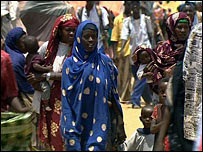 President George Bush recently visited five African countries — Ghana, Liberia, Tanzania, Benin and Rwanda — and sent his Secretary of State to Kenya to try to end the political crisis there. But when it comes to Somalia, the Bush administration is not only silent but openly supports Ethiopia's occupation. The situation there is now far worse than it was in December of 2006, before Addis Ababa's invasion.
President George Bush recently visited five African countries — Ghana, Liberia, Tanzania, Benin and Rwanda — and sent his Secretary of State to Kenya to try to end the political crisis there. But when it comes to Somalia, the Bush administration is not only silent but openly supports Ethiopia's occupation. The situation there is now far worse than it was in December of 2006, before Addis Ababa's invasion.In Mogadishu and much of Somalia, the American-supported Ethiopian intervention caused the deaths of more than 6,000 Somalis. According to United Nations officials, the humanitarian crisis in Somalia is "worse than Darfur" — more than a million Somalis fled their homes.
The Ethiopian occupation did not deliver the outcome that Washington desired — crushing the Islamists, creating a secure environment and leaving the country quickly. Instead, after more than a year of occupation, the picture is one of assassinations, bombings, looting, media repression and systematic displacement. Worse, there is no end in sight to the quagmire.
If there is the will, the U.S. and the rest of the international community can reverse the Somalia crisis.
The issue is not about fixing an artificial and illegitimate government that exists on the backs of Ethiopian soldiers and donors' money. The U.S. should aim at the real goals: ending the Ethiopian occupation (the source of Somalia's current problems), addressing the humanitarian catastrophe, initiating a genuine Somali-owned peace process, and dealing with the war crimes committed in the country.
It is about time the U.S. realizes that Ethiopia's occupation is radicalizing more Somalis and that the government of warlords is beyond repair. There is no choice: The occupation has to end immediately. Somalis do not want Ethiopian troops in their country and, based on the what has been happening so far, resistance to the occupation will only grow.
Ethiopian Prime Minister Meles Zenawi's scheme to create a no-win situation for the Somalis — accept the Ethiopian occupation or face a brutal civil war — will surely have a negative impact on long-term relations among the diverse communities in the Horn of Africa and different clans in Somalia. From the Somali perspective, Washington and the world community must understand that Ethiopia's occupation troops and their warlord proxies are a huge liability.
Moreover, there is an urgent need for a Somali-owned peace process. Earlier peace-building efforts failed because one or another key stakeholder was excluded. Islam as a faith and Islamists as a force cannot be ignored; the values these diverse Islamist groups represent have roots within the Somali people and must be included in any peace process. Dismissing those forces resisting the Ethiopian occupation as terrorists is neither accurate nor useful for building peace in Somalia.
The U.S. also needs to understand that its policy preference of incrementally fixing the results of the Ethiopian-manipulated peace conference in Nairobi (or imposing the Ethiopian design on the Somalis, as many believe) is untenable — the process that produced the current charter, parliament and government was tainted. What is needed is a comprehensive process that addresses governance, security and justice. The debate should start with Somalia's 1960 constitution — it is the only one that a majority of Somalis voted for and one that can accommodate different groups' constitutional and policy concerns.
The real challenge is establishing a Somali-owned peace process. One important precondition would be to empower a neutral and credible third party. The UN understands this, and urged the Saudi government to take the lead. Others believe Qatar would be an excellent candidate. The international community should also tap the expertise and connections of the Djibouti government and its president, Ismail Omar Guelleh. As an ethnic Somali, Mr. Guelleh understands the nature of the conflict, and he has good relations with Washington. He might be able to facilitate such a process if the international community is serious about ending the conflict.
Charles Taylor, Liberia's former warlord/president, is on trial for the crimes that his forces and his proxies committed against the civilians of neighbouring Sierra Leone. Therefore, the international community should not turn a blind eye when it comes to the war crimes that Ethiopia's troops and proxy Somali warlords have been committing against Somalis for the past year. Perhaps the recently created, New York-based Global Centre for the Responsibility to Protect should make Somalia its first project.
If a Somali-owned peace process is established, there will be no need for foreign forces — Somalis will keep the peace as they did in peaceful areas of the country, and they will challenge all forms of extremism. The key to bringing the Somali people on board is ending the Ethiopian occupation and the warlords' impunity.
The international community has a responsibility to protect Somali civilians from Ethiopia's occupation troops. Its silence sends the wrong message — that Ethiopian soldiers are in Somalia with its consent.
Afyare Abdi Elmi is a doctoral candidate and sessional lecturer in political science at the University of Alberta.
_______________________________________________________________To join the Globe and Mail discussion including reading my comments click the link below:













